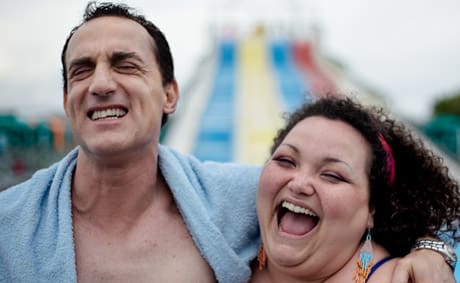Having been championed for his neorealist style of crime drama with Gomorrah, it's logical that Italian director Matteo Garrone would have some interest in the nature of the titular subject here, or at least modern conceptions of such, be it in day-to-day life or in the televised "reality" format.
While somewhat of a departure from his acclaimed 2008 drama, this exploration of current cultural notions of celebrity and success has merit in its own right, acting less of a criticism of reality television and more of a psychological deconstruction of its broader implications.
Husband and father Luciano (Aniello Arena) lives a decent middle-class life, running his fish market and occasionally dressing up as various characters to entertain his friends and family. While the need for external validation exists, his satisfaction with wife Maria (Loredana Simiolo) and his various friends and neighbours sustains a viable and desirable life.
But still, when Big Brother winner Enzo (Raffaele Ferrante) coasts around in a helicopter from event to event with photographers following, Luciano can't help but follow the herd, asking for signatures and photographs at every opportunity.
This is why the lure of appearing on the new season of Big Brother – a reality program used as much for its ubiquity as its thematically appropriate title – ultimately takes over Luciano's life, causing him to behave irrationally for fear of constant judgment from looming television producers presumably walking around undercover to gauge the merit of potential contestants.
In addition to exaggerating how affected an identity becomes when observed by an omniscient eye, Garrone's incisive comedy-drama comments on the dangers of socializing people to believe that success comes from performing a glossy, insincere ideal for validation without developing any economically viable skillsets.
Clever and intriguing in premise, the main issue here is that of engagement. Luciano's increasingly erratic behaviour makes sense thematically, but because he's so unbelievably deluded and stupid, watching him screw himself and his family over for two hours proves exceedingly frustrating.
It's easy to appreciate the implication that reality culture creates a distorted sense of self, but being forced into that mindset as a viewer is painful, especially when the intended comedy isn't particularly funny and the drama isn't especially compelling.
(Mongrel Media)While somewhat of a departure from his acclaimed 2008 drama, this exploration of current cultural notions of celebrity and success has merit in its own right, acting less of a criticism of reality television and more of a psychological deconstruction of its broader implications.
Husband and father Luciano (Aniello Arena) lives a decent middle-class life, running his fish market and occasionally dressing up as various characters to entertain his friends and family. While the need for external validation exists, his satisfaction with wife Maria (Loredana Simiolo) and his various friends and neighbours sustains a viable and desirable life.
But still, when Big Brother winner Enzo (Raffaele Ferrante) coasts around in a helicopter from event to event with photographers following, Luciano can't help but follow the herd, asking for signatures and photographs at every opportunity.
This is why the lure of appearing on the new season of Big Brother – a reality program used as much for its ubiquity as its thematically appropriate title – ultimately takes over Luciano's life, causing him to behave irrationally for fear of constant judgment from looming television producers presumably walking around undercover to gauge the merit of potential contestants.
In addition to exaggerating how affected an identity becomes when observed by an omniscient eye, Garrone's incisive comedy-drama comments on the dangers of socializing people to believe that success comes from performing a glossy, insincere ideal for validation without developing any economically viable skillsets.
Clever and intriguing in premise, the main issue here is that of engagement. Luciano's increasingly erratic behaviour makes sense thematically, but because he's so unbelievably deluded and stupid, watching him screw himself and his family over for two hours proves exceedingly frustrating.
It's easy to appreciate the implication that reality culture creates a distorted sense of self, but being forced into that mindset as a viewer is painful, especially when the intended comedy isn't particularly funny and the drama isn't especially compelling.
